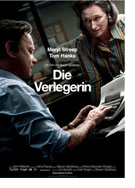

Opening 22 Feb 2018
Directed by:
Steven Spielberg
Writing credits:
Liz Hannah, Josh Singer
Principal actors:
Meryl Streep, Tom Hanks, Sarah Paulson, Bob Odenkirk, Bruce Greenwood
Katherine (Kay) Graham (Streep), publisher of The Washington Post, is impossibly irritating at the start of the film. It is 1971, and she has taken over the control of her family’s newspaper after her husband’s suicide, but she has no idea how to assert her control. She has been a stay-at-home mother and occasional hostess well into her forties and never held a paid job. So here we have Kay, wounded and insecure, walking into a board meeting of assertive males in black suits who look right through her. She hems and haws and loses her voice.
This is a decisive moment in newspaper history. The Post has decided to go public, and it is essential for the future of the paper that an adequate market price be reached. In the middle of this the New York Times publishes a huge scoop: the first highly secret Pentagon Papers, revealing the deception practiced by four presidents in US Vietnam involvement. The Times receives a court order to stop publication, and Post newsroom director Ben Bradlee (Hanks) sniffs out the original documents from the Times’ source Daniel Ellsberg (Rhys).
Until now the Post has been more of a regional newspaper with emphasis on an inside view of Washington society. Robert McNamara (Greenwood) is a close family friend of the Grahams, and Bradlee and his wife had been vacation friends with John and Jackie Kennedy. Kay is now faced with the decision whether or not to publish parts of the Pentagon Papers in the Post, antagonize her government friends, and risk prison for contempt of court and financial ruin from the collapse of the stock issue. In short, her entire life is at stake.
It is the achievement of Spielberg’s direction and Hanks’ and Streep’s genius that the drama of this historic moment is palpable and totally gripping. Kay’s particularly vulnerable position is absolutely convincing and I could identify with her moments of self-doubt in the male-dominated world of the seventies. The development of respect and partnership between the publisher and the editor, Graham and Bradlee, is remarkable and is a main theme of the film.
I can highly recommend this film for superb acting and a focused view of that moment in time when a great publisher and a truly national newspaper emerged. (Ann Gebauer-Thompson)